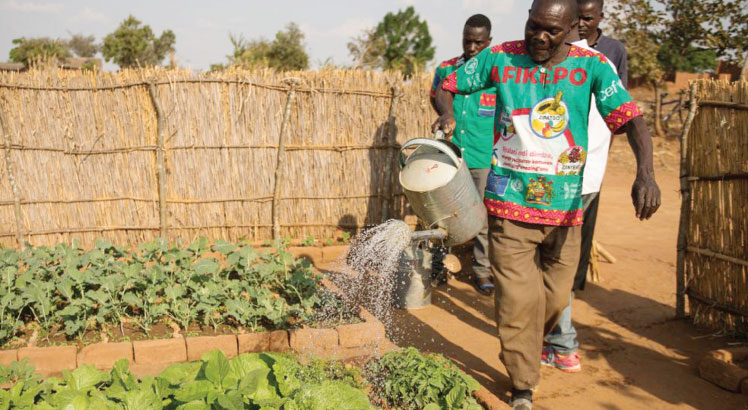Superdads power family nutrition
Men are breadwinners in most households in Malawi, but some of them take an active part in household affairs, particularly decisions around nutrition and food preparation.
For many, these are considered a woman’s duties.
But a growing cadre of super dads such as Martin Nyirenda and Anderson Mbeye, from Traditional Authority Kaluluma in Kasungu, are rising against such stereotypes and actively participating in making decisions affecting their households’ food uptake, including children’s nutrition, sanitation and hygiene.
The super dads are determined to go to the ends of the earth to provide for their families and ensure they are well-fed.
Nyirenda, from Luziwa Village, is the secretary of Umodzi Fathers’ Group, which started in December 2021 with support from Afikepo Nutrition Programme funded by the European Union in partnership with Unicef Malawi and the Government of Malawi.
They encourage fellow men to take an active role in promoting nutrition in their families.
“It is a man’s responsibility to take part in household chores, especially when his wife is pregnant. Some problems can be avoided if a man takes part in domestic chores,” says Nyirenda.
Afikepo project strives to end stunting in children aged below five years, pregnant women, breastfeeding mothers and adolescent girls.

Haswell Mulenga, Nutritionist for Afikepo in Kasungu, says they realised that excluding men would hamper the promotion of good nutrition at the household level.
“The target groups are often dominated by women,” he says. “But to end stunting, the father must also be involved. If you have the support of the head of the house, everything goes on smoothly.”
Mulenga envisages male involvement in helping men gain vital nutrition tips and participating in ending malnutrition, especially stunting, in their communities.
“Women gain a lot of knowledge on nutrition from various groups they belong to, but most men don’t have that knowledge. As a result, they can’t understand why they need to eat six groups of food.
Mulenga says equipping a man with nutrition knowledge makes it is easier for him to take care of adolescents, under-fives, pregnant women and also breastfeeding mothers.
Since Nyirenda joined the group in January, he has become a champion of good nutrition for his family.
Apart from providing for them, he sometimes cooks and performs other household chores.
He explains: “There are some foodstuffs such as cooking oil or meat which a woman alone may not afford. So, if I don’t take care of the nutritional needs of my family and their hygiene, then who will?
“That’s why I find it important to take part. If my wife is sick, she doesn’t have to cook for the family when I am around, it is my duty to do so.”.
His wife, Alinafe Zimba, agrees.
“Before men were engaged under the Afikepo Project, it was difficult to convince them to buy some foods. Now that they know the importance of six food groups, it’s not difficult to convince them to do so,” says Zimba.
Life has not been easy for men such as Nyirenda and Mbeye, who are constantly ribbed by their friends, but they won’t let mockery stand between them and the nutrition and care their families need.
“For all we do for our families, some men say we are being controlled by our wives. But we try to sensitise them on the importance of male involvement in taking care of the health of their families,” says Mbeye, from Mkanda Village.
Members of the fathers’ groups encourage each other to participate in activities that promote good household nutrition.
“As men, we need to help our women, especially when they are pregnant. A child needs supplementary foods to grow properly and it’s my duty as a father to provide that,” says Mbeye.
Unicef and the Food and Agriculture Organization of the United Nations are implementing the Afikepo nutrition programme in 10 districts.
Apart from Kasungu, the other districts are Chitipa, Karonga, Mzimba, Nkhata Bay, Nkhotakota, Salima, Chiradzulu, Thyolo and Mulanje.





